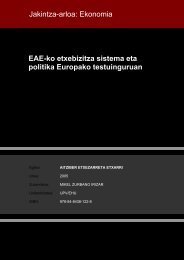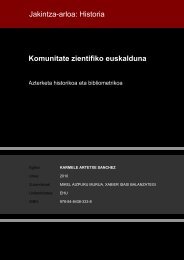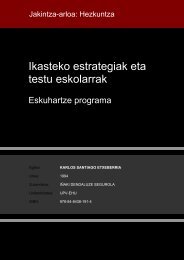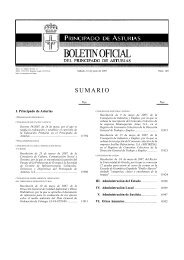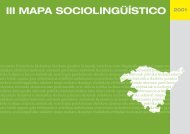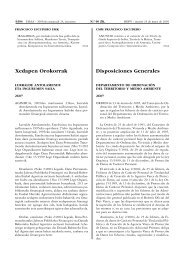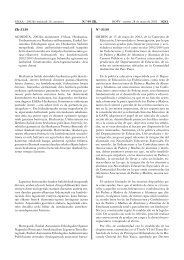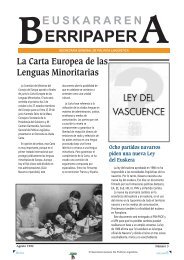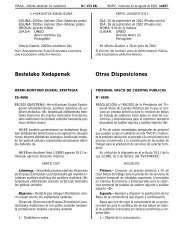- Page 1 and 2:
Jakintza-arloa: Hezkuntza.Soziologi
- Page 3 and 4:
EUSKAL NAZIONALISMOA ETA HEZKUNTZA
- Page 5 and 6:
II. ATALA: NAZIONALISMOA ETA HEZKUN
- Page 7 and 8:
3.6.- IPAR EUSKAL HERRIKO NAZIONALI
- Page 9 and 10:
ESKERRONAK Lana gorpuzten zihoan ne
- Page 11 and 12:
2 Euskal nazionalismoa eta hezkuntz
- Page 13 and 14:
4 Euskal nazionalismoa eta hezkuntz
- Page 15 and 16:
I. ATALA: ESTATUA, NAZIOA ETA NAZIO
- Page 17 and 18:
18 Euskal nazionalismoa eta hezkunt
- Page 19 and 20:
20 Euskal nazionalismoa eta hezkunt
- Page 21 and 22:
22 Euskal nazionalismoa eta hezkunt
- Page 23 and 24:
24 Euskal nazionalismoa eta hezkunt
- Page 25 and 26:
26 Euskal nazionalismoa eta hezkunt
- Page 27 and 28:
28 Euskal nazionalismoa eta hezkunt
- Page 29 and 30:
30 Euskal nazionalismoa eta hezkunt
- Page 31 and 32:
32 Euskal nazionalismoa eta hezkunt
- Page 33 and 34:
34 Euskal nazionalismoa eta hezkunt
- Page 35 and 36:
36 Euskal nazionalismoa eta hezkunt
- Page 37 and 38:
38 Euskal nazionalismoa eta hezkunt
- Page 39 and 40:
40 Euskal nazionalismoa eta hezkunt
- Page 41 and 42:
42 Euskal nazionalismoa eta hezkunt
- Page 43 and 44:
44 Euskal nazionalismoa eta hezkunt
- Page 45 and 46:
46 Euskal nazionalismoa eta hezkunt
- Page 47 and 48:
48 Euskal nazionalismoa eta hezkunt
- Page 49 and 50:
50 Euskal nazionalismoa eta hezkunt
- Page 51 and 52:
52 Euskal nazionalismoa eta hezkunt
- Page 53 and 54:
54 Euskal nazionalismoa eta hezkunt
- Page 55 and 56:
56 Euskal nazionalismoa eta hezkunt
- Page 57 and 58:
58 Euskal nazionalismoa eta hezkunt
- Page 59 and 60:
60 Euskal nazionalismoa eta hezkunt
- Page 61 and 62:
62 Euskal nazionalismoa eta hezkunt
- Page 63 and 64:
64 Euskal nazionalismoa eta hezkunt
- Page 65 and 66:
66 Euskal nazionalismoa eta hezkunt
- Page 67 and 68: 68 Euskal nazionalismoa eta hezkunt
- Page 69 and 70: 70 Euskal nazionalismoa eta hezkunt
- Page 71 and 72: 72 Euskal nazionalismoa eta hezkunt
- Page 73 and 74: 74 Euskal nazionalismoa eta hezkunt
- Page 75 and 76: 76 Euskal nazionalismoa eta hezkunt
- Page 77 and 78: 78 Euskal nazionalismoa eta hezkunt
- Page 79 and 80: Nazionalismoa eta hezkuntza 83 2.1.
- Page 81 and 82: Nazionalismoa eta hezkuntza 85 prob
- Page 83 and 84: Nazionalismoa eta hezkuntza 87 Hezk
- Page 85 and 86: Nazionalismoa eta hezkuntza 89 Ildo
- Page 87 and 88: Nazionalismoa eta hezkuntza 91 2.2.
- Page 89 and 90: Nazionalismoa eta hezkuntza 93 “S
- Page 91 and 92: Nazionalismoa eta hezkuntza 95 Durk
- Page 93 and 94: Nazionalismoa eta hezkuntza 97 beti
- Page 95 and 96: Nazionalismoa eta hezkuntza 99 Leni
- Page 97 and 98: Nazionalismoa eta hezkuntza 101 Bes
- Page 99 and 100: Nazionalismoa eta hezkuntza 103 Azk
- Page 101 and 102: Nazionalismoa eta hezkuntza 105 c)
- Page 103 and 104: Nazionalismoa eta hezkuntza 107 bak
- Page 105 and 106: Nazionalismoa eta hezkuntza 109 hom
- Page 107 and 108: Nazionalismoa eta hezkuntza 111 eta
- Page 109 and 110: Nazionalismoa eta hezkuntza 113 aha
- Page 111 and 112: Nazionalismoa eta hezkuntza 115 nek
- Page 113 and 114: Nazionalismoa eta hezkuntza 117 zai
- Page 115 and 116: Nazionalismoa eta hezkuntza 119 oin
- Page 117: Nazionalismoa eta hezkuntza 121 Arl
- Page 121 and 122: Nazionalismoa eta hezkuntza 125 ez
- Page 123 and 124: Nazionalismoa eta hezkuntza 127 egu
- Page 125 and 126: Nazionalismoa eta hezkuntza 129 jar
- Page 127 and 128: Nazionalismoa eta hezkuntza 131 "..
- Page 129 and 130: Nazionalismoa eta hezkuntza 133 XVI
- Page 131 and 132: Nazionalismoa eta hezkuntza 135 edu
- Page 133 and 134: Nazionalismoa eta hezkuntza 137 zeu
- Page 135 and 136: Nazionalismoa eta hezkuntza 139 Har
- Page 137 and 138: Nazionalismoa eta hezkuntza 141 lib
- Page 139 and 140: Nazionalismoa eta hezkuntza 143 mod
- Page 141 and 142: Nazionalismoa eta hezkuntza 145 Hon
- Page 143 and 144: Nazionalismoa eta hezkuntza 147 bil
- Page 145 and 146: Nazionalismoa eta hezkuntza 149 2.4
- Page 147 and 148: Nazionalismoa eta hezkuntza 151 eta
- Page 149 and 150: Nazionalismoa eta hezkuntza 153 hel
- Page 151 and 152: Nazionalismoa eta hezkuntza 155 "..
- Page 153 and 154: Nazionalismoa eta hezkuntza 157 den
- Page 155 and 156: Nazionalismoa eta hezkuntza 159 Giz
- Page 157 and 158: Nazionalismoa eta hezkuntza 161 gau
- Page 159 and 160: Nazionalismoa eta hezkuntza 163 K.
- Page 161 and 162: Nazionalismoa eta hezkuntza 165 alg
- Page 163 and 164: Nazionalismoa eta hezkuntza 167 hor
- Page 165 and 166: Nazionalismoa eta hezkuntza 169 man
- Page 167 and 168: Nazionalismoa eta hezkuntza 171 Ezk
- Page 169 and 170:
Nazionalismoa eta hezkuntza 173 kon
- Page 171 and 172:
Nazionalismoa eta hezkuntza 175 bez
- Page 173 and 174:
Nazionalismoa eta hezkuntza 177 gau
- Page 175 and 176:
Nazionalismoa eta hezkuntza 179 def
- Page 177 and 178:
Nazionalismoa eta hezkuntza 181 Ipa
- Page 179 and 180:
Nazionalismoa eta hezkuntza 183 ban
- Page 181 and 182:
Nazionalismoa eta hezkuntza 185 nah
- Page 183 and 184:
Nazionalismoa eta hezkuntza 187 Ipa
- Page 185 and 186:
Nazionalismoa eta hezkuntza 189 ara
- Page 187 and 188:
Nazionalismoa eta hezkuntza 191 kat
- Page 189 and 190:
Nazionalismoa eta hezkuntza 193 pos
- Page 191 and 192:
Nazionalismoa eta hezkuntza 195 Hez
- Page 193 and 194:
Nazionalismoa eta hezkuntza 197 fin
- Page 195 and 196:
Nazionalismoa eta hezkuntza 199 naz
- Page 197 and 198:
Euskal nazionalismoa eta hezkuntza:
- Page 199 and 200:
Euskal nazionalismoa eta hezkuntza:
- Page 201 and 202:
Euskal nazionalismoa eta hezkuntza:
- Page 203 and 204:
Euskal nazionalismoa eta hezkuntza:
- Page 205 and 206:
Euskal nazionalismoa eta hezkuntza:
- Page 207 and 208:
Euskal nazionalismoa eta hezkuntza:
- Page 209 and 210:
Euskal nazionalismoa eta hezkuntza:
- Page 211 and 212:
Euskal nazionalismoa eta hezkuntza:
- Page 213 and 214:
Euskal nazionalismoa eta hezkuntza:
- Page 215 and 216:
Euskal nazionalismoa eta hezkuntza:
- Page 217 and 218:
Euskal nazionalismoa eta hezkuntza:
- Page 219 and 220:
Euskal nazionalismoa eta hezkuntza:
- Page 221 and 222:
Euskal nazionalismoa eta hezkuntza:
- Page 223 and 224:
Euskal nazionalismoa eta hezkuntza:
- Page 225 and 226:
Euskal nazionalismoa eta hezkuntza:
- Page 227 and 228:
Euskal nazionalismoa eta hezkuntza:
- Page 229 and 230:
Euskal nazionalismoa eta hezkuntza:
- Page 231 and 232:
Euskal nazionalismoa eta hezkuntza:
- Page 233 and 234:
Euskal nazionalismoa eta hezkuntza:
- Page 235 and 236:
Euskal nazionalismoa eta hezkuntza:
- Page 237 and 238:
Euskal nazionalismoa eta hezkuntza:
- Page 239 and 240:
Euskal nazionalismoa eta hezkuntza:
- Page 241 and 242:
Euskal nazionalismoa eta hezkuntza:
- Page 243 and 244:
Euskal nazionalismoa eta hezkuntza:
- Page 245 and 246:
Euskal nazionalismoa eta hezkuntza:
- Page 247 and 248:
Euskal nazionalismoa eta hezkuntza:
- Page 249 and 250:
Euskal nazionalismoa eta hezkuntza:
- Page 251 and 252:
Euskal nazionalismoa eta hezkuntza:
- Page 253 and 254:
Euskal nazionalismoa eta hezkuntza:
- Page 255 and 256:
Euskal nazionalismoa eta hezkuntza:
- Page 257 and 258:
Euskal nazionalismoa eta hezkuntza:
- Page 259 and 260:
Euskal nazionalismoa eta hezkuntza:
- Page 261 and 262:
Euskal nazionalismoa eta hezkuntza:
- Page 263 and 264:
Euskal nazionalismoa eta hezkuntza:
- Page 265 and 266:
Euskal nazionalismoa eta hezkuntza:
- Page 267 and 268:
Euskal nazionalismoa eta hezkuntza:
- Page 269 and 270:
Euskal nazionalismoa eta hezkuntza:
- Page 271 and 272:
Euskal nazionalismoa eta hezkuntza:
- Page 273 and 274:
Euskal nazionalismoa eta hezkuntza:
- Page 275 and 276:
Euskal nazionalismoa eta hezkuntza:
- Page 277 and 278:
Euskal nazionalismoa eta hezkuntza:
- Page 279 and 280:
Euskal nazionalismoa eta hezkuntza:
- Page 281 and 282:
Euskal nazionalismoa eta hezkuntza:
- Page 283 and 284:
Euskal nazionalismoa eta hezkuntza:
- Page 285 and 286:
Euskal nazionalismoa eta hezkuntza:
- Page 287 and 288:
Euskal nazionalismoa eta hezkuntza:
- Page 289 and 290:
Euskal nazionalismoa eta hezkuntza:
- Page 291 and 292:
Euskal nazionalismoa eta hezkuntza:
- Page 293 and 294:
Euskal nazionalismoa eta hezkuntza:
- Page 295 and 296:
Euskal nazionalismoa eta hezkuntza:
- Page 297 and 298:
Euskal nazionalismoa eta hezkuntza:
- Page 299 and 300:
Euskal nazionalismoa eta hezkuntza:
- Page 301 and 302:
Euskal nazionalismoa eta hezkuntza:
- Page 303 and 304:
Euskal nazionalismoa eta hezkuntza:
- Page 305 and 306:
Euskal nazionalismoa eta hezkuntza:
- Page 307 and 308:
Euskal nazionalismoa eta hezkuntza:
- Page 309 and 310:
Euskal nazionalismoa eta hezkuntza:
- Page 311 and 312:
Euskal nazionalismoa eta hezkuntza:
- Page 313 and 314:
Euskal nazionalismoa eta hezkuntza:
- Page 315 and 316:
Euskal nazionalismoa eta hezkuntza:
- Page 317 and 318:
Euskal nazionalismoa eta hezkuntza:
- Page 319 and 320:
Euskal nazionalismoa eta hezkuntza:
- Page 321 and 322:
Euskal nazionalismoa eta hezkuntza:
- Page 323 and 324:
Euskal nazionalismoa eta hezkuntza:
- Page 325 and 326:
Euskal nazionalismoa eta hezkuntza:
- Page 327 and 328:
Euskal nazionalismoa eta hezkuntza:
- Page 329 and 330:
Euskal nazionalismoa eta hezkuntza:
- Page 331 and 332:
Euskal nazionalismoa eta hezkuntza:
- Page 333 and 334:
Euskal nazionalismoa eta hezkuntza:
- Page 335 and 336:
IV. ATALA: EUSKAL NAZIONALISMOA ETA
- Page 337 and 338:
370 Euskal nazionalismoa eta hezkun
- Page 339 and 340:
372 Euskal nazionalismoa eta hezkun
- Page 341 and 342:
374 Euskal nazionalismoa eta hezkun
- Page 343 and 344:
376 Euskal nazionalismoa eta hezkun
- Page 345 and 346:
378 Euskal nazionalismoa eta hezkun
- Page 347 and 348:
380 Euskal nazionalismoa eta hezkun
- Page 349 and 350:
382 Euskal nazionalismoa eta hezkun
- Page 351 and 352:
384 Euskal nazionalismoa eta hezkun
- Page 353 and 354:
386 Euskal nazionalismoa eta hezkun
- Page 355 and 356:
388 Euskal nazionalismoa eta hezkun
- Page 357 and 358:
390 Euskal nazionalismoa eta hezkun
- Page 359 and 360:
392 Euskal nazionalismoa eta hezkun
- Page 361 and 362:
394 Euskal nazionalismoa eta hezkun
- Page 363 and 364:
396 Euskal nazionalismoa eta hezkun
- Page 365 and 366:
398 Euskal nazionalismoa eta hezkun
- Page 367 and 368:
400 Euskal nazionalismoa eta hezkun
- Page 369 and 370:
402 Euskal nazionalismoa eta hezkun
- Page 371 and 372:
404 Euskal nazionalismoa eta hezkun
- Page 373 and 374:
406 Euskal nazionalismoa eta hezkun
- Page 375 and 376:
408 Euskal nazionalismoa eta hezkun
- Page 377 and 378:
410 Euskal nazionalismoa eta hezkun
- Page 379 and 380:
412 Euskal nazionalismoa eta hezkun
- Page 381 and 382:
414 Euskal nazionalismoa eta hezkun
- Page 383 and 384:
416 Euskal nazionalismoa eta hezkun
- Page 385 and 386:
418 Euskal nazionalismoa eta hezkun
- Page 387 and 388:
420 Euskal nazionalismoa eta hezkun
- Page 389 and 390:
422 Euskal nazionalismoa eta hezkun
- Page 391 and 392:
424 Euskal nazionalismoa eta hezkun
- Page 393 and 394:
426 Euskal nazionalismoa eta hezkun
- Page 395 and 396:
428 Euskal nazionalismoa eta hezkun
- Page 397 and 398:
430 Euskal nazionalismoa eta hezkun
- Page 399 and 400:
432 Euskal nazionalismoa eta hezkun
- Page 401 and 402:
434 Euskal nazionalismoa eta hezkun
- Page 403 and 404:
436 Euskal nazionalismoa eta hezkun
- Page 405 and 406:
438 Euskal nazionalismoa eta hezkun
- Page 407 and 408:
440 Euskal nazionalismoa eta hezkun
- Page 409 and 410:
442 Euskal nazionalismoa eta hezkun
- Page 411 and 412:
444 Euskal nazionalismoa eta hezkun
- Page 413 and 414:
446 Euskal nazionalismoa eta hezkun
- Page 415 and 416:
448 Euskal nazionalismoa eta hezkun
- Page 417 and 418:
450 Euskal nazionalismoa eta hezkun
- Page 419 and 420:
452 Euskal nazionalismoa eta hezkun
- Page 421 and 422:
454 Euskal nazionalismoa eta hezkun
- Page 423 and 424:
456 Euskal nazionalismoa eta hezkun
- Page 425 and 426:
458 Euskal nazionalismoa eta hezkun
- Page 427 and 428:
460 Euskal nazionalismoa eta hezkun
- Page 429 and 430:
462 Euskal nazionalismoa eta hezkun
- Page 431 and 432:
464 Euskal nazionalismoa eta hezkun
- Page 433 and 434:
466 Euskal nazionalismoa eta hezkun
- Page 435 and 436:
468 Euskal nazionalismoa eta hezkun
- Page 437 and 438:
470 Euskal nazionalismoa eta hezkun
- Page 439 and 440:
472 Euskal nazionalismoa eta hezkun
- Page 441 and 442:
474 Euskal nazionalismoa eta hezkun
- Page 443 and 444:
476 Euskal nazionalismoa eta hezkun
- Page 445 and 446:
478 Euskal nazionalismoa eta hezkun
- Page 447 and 448:
480 Euskal nazionalismoa eta hezkun
- Page 449 and 450:
482 Euskal nazionalismoa eta hezkun
- Page 451 and 452:
484 Euskal nazionalismoa eta hezkun
- Page 453 and 454:
486 Euskal nazionalismoa eta hezkun
- Page 455 and 456:
488 Euskal nazionalismoa eta hezkun
- Page 457 and 458:
490 Euskal nazionalismoa eta hezkun
- Page 459 and 460:
492 Euskal nazionalismoa eta hezkun
- Page 461 and 462:
494 Euskal nazionalismoa eta hezkun
- Page 463 and 464:
496 Euskal nazionalismoa eta hezkun
- Page 465 and 466:
498 Euskal nazionalismoa eta hezkun
- Page 467 and 468:
500 Euskal nazionalismoa eta hezkun
- Page 469 and 470:
502 Euskal nazionalismoa eta hezkun
- Page 471 and 472:
504 Euskal nazionalismoa eta hezkun
- Page 473 and 474:
506 Euskal nazionalismoa eta hezkun
- Page 475 and 476:
508 Euskal nazionalismoa eta hezkun
- Page 477 and 478:
510 Euskal nazionalismoa eta hezkun
- Page 479 and 480:
512 Euskal nazionalismoa eta hezkun
- Page 481 and 482:
514 Euskal nazionalismoa eta hezkun
- Page 483 and 484:
516 Euskal nazionalismoa eta hezkun
- Page 485 and 486:
518 Euskal nazionalismoa eta hezkun
- Page 487 and 488:
520 Euskal nazionalismoa eta hezkun
- Page 489 and 490:
522 Euskal nazionalismoa eta hezkun
- Page 491 and 492:
524 Euskal nazionalismoa eta hezkun
- Page 493 and 494:
526 Euskal nazionalismoa eta hezkun
- Page 495 and 496:
528 Euskal nazionalismoa eta hezkun
- Page 497 and 498:
530 Euskal nazionalismoa eta hezkun
- Page 499 and 500:
532 Euskal nazionalismoa eta hezkun
- Page 501 and 502:
534 Euskal nazionalismoa eta hezkun
- Page 503 and 504:
536 Euskal nazionalismoa eta hezkun
- Page 505 and 506:
538 Euskal nazionalismoa eta hezkun
- Page 507 and 508:
540 Euskal nazionalismoa eta hezkun
- Page 509 and 510:
542 Euskal nazionalismoa eta hezkun
- Page 511 and 512:
544 Euskal nazionalismoa eta hezkun
- Page 513 and 514:
546 Euskal nazionalismoa eta hezkun
- Page 515 and 516:
548 Euskal nazionalismoa eta hezkun
- Page 517 and 518:
550 Euskal nazionalismoa eta hezkun
- Page 519 and 520:
552 Euskal nazionalismoa eta hezkun
- Page 521 and 522:
554 Euskal nazionalismoa eta hezkun
- Page 523 and 524:
556 Euskal nazionalismoa eta hezkun
- Page 525 and 526:
558 Euskal nazionalismoa eta hezkun
- Page 527 and 528:
560 Euskal nazionalismoa eta hezkun
- Page 529 and 530:
562 Euskal nazionalismoa eta hezkun
- Page 531 and 532:
564 Euskal nazionalismoa eta hezkun
- Page 533 and 534:
566 Euskal nazionalismoa eta hezkun
- Page 535 and 536:
568 Euskal nazionalismoa eta hezkun
- Page 537 and 538:
570 Euskal nazionalismoa eta hezkun
- Page 539 and 540:
572 Euskal nazionalismoa eta hezkun
- Page 541 and 542:
574 Euskal nazionalismoa eta hezkun
- Page 543 and 544:
576 Euskal nazionalismoa eta hezkun
- Page 545 and 546:
578 Euskal nazionalismoa eta hezkun
- Page 547 and 548:
580 Euskal nazionalismoa eta hezkun
- Page 549 and 550:
582 Euskal nazionalismoa eta hezkun
- Page 551 and 552:
584 Euskal nazionalismoa eta hezkun
- Page 553 and 554:
592 Euskal nazionalismoa eta hezkun
- Page 555 and 556:
594 Euskal nazionalismoa eta hezkun
- Page 557 and 558:
596 Euskal nazionalismoa eta hezkun
- Page 559 and 560:
598 Euskal nazionalismoa eta hezkun
- Page 561 and 562:
600 Euskal nazionalismoa eta hezkun
- Page 563 and 564:
602 Euskal nazionalismoa eta hezkun
- Page 565 and 566:
606 Euskal nazionalismoa eta hezkun
- Page 567 and 568:
608 Euskal nazionalismoa eta hezkun
- Page 569 and 570:
610 Euskal nazionalismoa eta hezkun
- Page 571 and 572:
612 Euskal nazionalismoa eta hezkun
- Page 573 and 574:
614 Euskal nazionalismoa eta hezkun
- Page 575 and 576:
616 Euskal nazionalismoa eta hezkun
- Page 577 and 578:
618 Euskal nazionalismoa eta hezkun
- Page 579 and 580:
620 Euskal nazionalismoa eta hezkun
- Page 581 and 582:
622 Euskal nazionalismoa eta hezkun
- Page 583 and 584:
624 Euskal nazionalismoa eta hezkun
- Page 585 and 586:
626 Euskal nazionalismoa eta hezkun
- Page 587 and 588:
628 Euskal nazionalismoa eta hezkun
- Page 589 and 590:
630 Euskal nazionalismoa eta hezkun
- Page 591 and 592:
632 Euskal nazionalismoa eta hezkun
- Page 593 and 594:
634 Euskal nazionalismoa eta hezkun
- Page 595 and 596:
636 Euskal nazionalismoa eta hezkun
- Page 597 and 598:
638 Euskal nazionalismoa eta hezkun
- Page 599 and 600:
640 Euskal nazionalismoa eta hezkun




